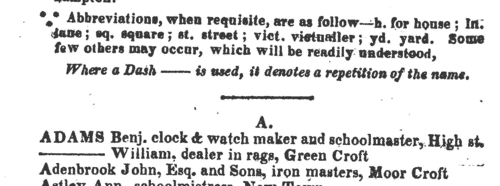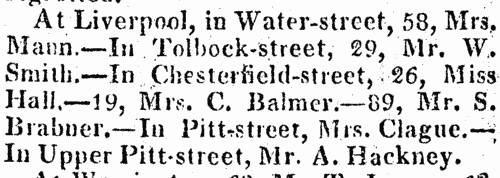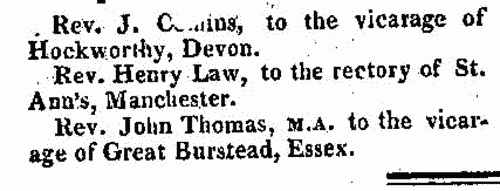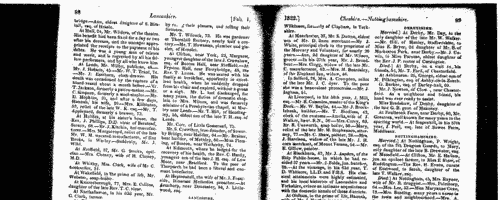Add this eBook to your basket to receive access to all 374 records. Our indexes include entries for the spelling gorton. In the period you have requested, we have the following 374 records (displaying 131 to 140): These sample scans are from the original record. You will get scans of the full pages or articles where the surname you searched for has been found. Your web browser may prevent the sample windows from opening; in this case please change your browser settings to allow pop-up windows from this site. Lichfield Directory
(1818)
The Staffordshire General and Commercial Directory was published by W. Parson and T. Bradshaw in 1818 in sections, 8 to 19 relating to towns in the centre of the county: 8. Abbots Bromley; 9. Burton-upon-Trent; 10. Cheadle; 11. Eccleshall; 12. Lichfield; 13. Longnor; 14. Penkridge; 15. Rugeley; 16. Stafford; 17. Stone; 18. Tamworth; 19. Uttoxeter. In each section the traders are listed alphabetically under surname, with occupation and address. | Sample scan, click to enlarge

| Wolverhampton Directory
(1818)
The Staffordshire General and Commercial Directory was published by W. Parson and T. Bradshaw in 1818 in sections, 21 to 30 relating to towns in the south of the county: 21. Bilston; 22. Brewood; 23. Darlaston; 24. Handsworth; 25. Tipton; 26. Walsall; 27. Wednesbury; 28. West Bromwich; 29. Willenhall; 30. Wolverhampton. In each section the traders are listed alphabetically under surname, with occupation and address. | Sample scan, click to enlarge

| Workers at Chorlton Cotton Mills
(1818)
The minutes of evidence taken before the Lords Committee on the Cotton Factories Bill include a series of reports by medical men as to the general health of the mill workers in April 1818. For each factory there is a complete list of workers, giving full name, age, how long employed in a factory, health (in general terms, such as 'Good' or 'Sickly'), and any chronic disease or 'distortion', cause and duration - with slight variations from report to report. The physicians examined several hundred people each day, asking such questions as 'Have you any swellings or sores anywhere?', 'Are your limbs straight?', 'Have you a good appetite for food?', 'Do you conceive yourself to be in good health?', and all concluded that the health of the mill workers was good, and that the workers were cheerful. This is the report for Birley & Hornby's Chorlton Mills. The report was divided into two sections, adults and children, and this is the report on the adults, 23 April 1818. | Sample scan, click to enlarge

| Workers at McConnel & Kennedy's Cotton Mill, Manchester
(1818)
The minutes of evidence taken before the Lords Committee on the Cotton Factories Bill include a series of reports by medical men as to the general health of the mill workers in April 1818. For each factory there is a complete list of workers, giving full name, age, how long employed in a factory, health (in general terms, such as 'Good' or 'Sickly'), and any chronic disease or 'distortion', cause and duration - with slight variations from report to report. The physicians examined several hundred people each day, asking such questions as 'Have you any swellings or sores anywhere?', 'Are your limbs straight?', 'Have you a good appetite for food?', 'Do you conceive yourself to be in good health?', and all concluded that the health of the mill workers was good, and that the workers were cheerful. This is the report for McConnel & Kennedy's cotton spinning factory in Manchester, 21 April 1818. | Sample scan, click to enlarge

| Workers at Pollard's Cotton Mill, Manchester
(1818)
The minutes of evidence taken before the Lords Committee on the Cotton Factories Bill include a series of reports by medical men as to the general health of the mill workers in April 1818. For each factory there is a complete list of workers, giving full name, age, how long employed in a factory, health (in general terms, such as 'Good' or 'Sickly'), and any chronic disease or 'distortion', cause and duration - with slight variations from report to report. The physicians examined several hundred people each day, asking such questions as 'Have you any swellings or sores anywhere?', 'Are your limbs straight?', 'Have you a good appetite for food?', 'Do you conceive yourself to be in good health?', and all concluded that the health of the mill workers was good, and that the workers were cheerful. This is the report for Pollard's spinning mill in Manchester, 20 April 1818. | Sample scan, click to enlarge

| Deaths, Marriages, Bankrupts, Dividends and Patents
(1820)
Death notices and obituaries, marriage and birth notices, bankrupts and dividends, and patents, as reported in the Monthly Magazine or British Register. Includes some marriages and deaths from Ireland, Scotland and abroad.
| Sample scan, click to enlarge

| Deaths, Marriages, Bankrupts, Dividends and Patents
(1820-1821)
Death notices and obituaries, marriage and birth notices, bankrupts and dividends, and patents, as reported in the Monthly Magazine or British Register. Includes some marriages and deaths from Ireland, Scotland and abroad.
| Sample scan, click to enlarge

| Deaths, Marriages, Bankrupts, Dividends and Patents
(1821)
Death notices and obituaries, marriage and birth notices, bankrupts and dividends, and patents, as reported in the Monthly Magazine or British Register. Includes some marriages and deaths from Ireland, Scotland and abroad.
| Sample scan, click to enlarge

| Anglican clergy in England and Wales
(1822)
The Monthly Magazine or British Register included a section each month of Ecclesiastical Preferments. These are the clergy listed in the 53rd volume, 1 February to 1 July 1822. | Sample scan, click to enlarge

| Deaths in Buckinghamshire and Berkshire
(1822)
The Monthly Magazine or British Register included a section each month called, enthusiastically, 'Provincial Occurrences, With all the Marriages and Deaths'. These are the deaths listed in the 53rd volume, 1 February to 1 July 1822, from Buckinghamshire and Berkshire. | Sample scan, click to enlarge

|
Research your ancestry, family history, genealogy and one-name study by direct access to original records and archives indexed by surname.
|











